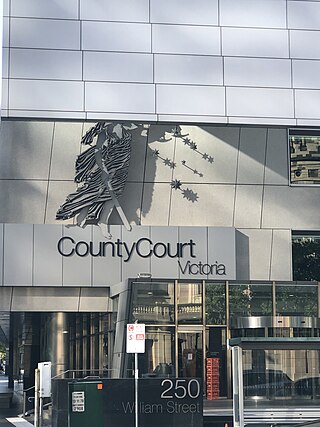
United States appellate procedure involves the rules and regulations for filing appeals in state courts and federal courts. The nature of an appeal can vary greatly depending on the type of case and the rules of the court in the jurisdiction where the case was prosecuted. There are many types of standard of review for appeals, such as de novo and abuse of discretion. However, most appeals begin when a party files a petition for review to a higher court for the purpose of overturning the lower court's decision.

In many common law jurisdictions, an indictable offence is an offence which can only be tried on an indictment after a preliminary hearing to determine whether there is a prima facie case to answer or by a grand jury. A similar concept in the United States is known as a felony, which for federal crimes, also requires an indictment. In Scotland, which is a hybrid common law jurisdiction, the procurator fiscal will commence solemn proceedings for serious crimes to be prosecuted on indictment before a jury.

In the law of the United States, diversity jurisdiction is a form of subject-matter jurisdiction that gives United States federal courts the power to hear lawsuits that do not involve a federal question. For a federal court to have diversity jurisdiction over a lawsuit, two conditions must be met. First, there must be "diversity of citizenship" between the parties, meaning the plaintiffs must be citizens of different U.S. states than the defendants. Second, the lawsuit's "amount in controversy" must be more than $75,000. If a lawsuit does not meet these two conditions, federal courts will normally lack the jurisdiction to hear it unless it involves a federal question, and the lawsuit would need to be heard in state court instead.
Railroad Commission v. Pullman Co., 312 U.S. 496 (1941), was a case in which the United States Supreme Court determined that it was appropriate for United States federal courts to abstain from hearing a case in order to allow state courts to decide substantial Constitutional issues that touch upon sensitive areas of state social policy.
Central Railroad & Banking Co. of Ga. v. Pettus, 113 U.S. 116 (1885), was an appeal from a decree of the Circuit Court of the United States for the Middle district of Alabama in favor of the appellees, Pettus & Dawson and Watts & Sons, adjudging them entitled to the sum of, 161.21, and interest thereon at eight percent per annum from March 7, 1881, with lien, to secure its payment, upon the roadbed, depots, side tracks, turnouts, trestles, and bridges owned and used by the appellants, corporations of the State of Georgia, in operating the railroad formerly belonging to the Montgomery and West Point Railroad Company, an Alabama corporation, and which extends from Montgomery to West Point with a branch from Opelika to Columbus. This property was directed to be exposed to sale unless within a given time the said amount was paid. This suit is the outgrowth of certain litigation in the courts of Alabama relating to the before-mentioned and other railroad property in which the appellants are interested.

Clawson v. United States, 113 U.S. 143 (1885), was a case regarding a Utah territorial statute which authorized an appeal by a defendant in a criminal action from a final judgment of conviction, which provides that an appeal shall stay execution upon filing with the clerk a certificate of a judge that in his opinion there is probable cause for the appeal, and further provides that after conviction, a defendant who has appealed may be admitted to bail as of right when the judgment is for the payment of a fine only, and as matter of discretion in other cases, does not confer upon a defendant convicted and sentenced to pay a fine and be imprisoned the right, after appeal and filing of certificate of probable cause, to be admitted to bail except within the discretion of the court.
Nashville, Chattanooga & St. Louis Railway Co. v. United States, 113 U.S. 261 (1885), regarded a suit brought by the United States against a railroad company, Nashville, Chattanooga and St. Louis Railway, to recover monies paid for delivery of United States mail in Tennessee from March 31 to June 8, 1861.
Sully v. Drennan, 113 U.S. 287 (1885), was an appeal from an order of the Circuit Court for the Southern District of Iowa in the United States remanding to the state court a case which had been removed from the state into the circuit court.
Baylis v. Travelers' Insurance Company, 113 U.S. 316 (1885), was a case where after close of testimony in a trial, the defendant moved to dismiss on the ground of the insufficiency of the evidence to sustain a verdict. This motion was denied and the plaintiff asked that the case be submitted to the jury to determine the facts on the evidence. The court refused this, and plaintiff excepted. The court then ordered a verdict for plaintiff, subject to its opinion, whether the facts proved were sufficient to render defendant liable to plaintiff on the cause of action stated. Plaintiff moved for judgment on the verdict, and defendant moved for judgment on the pleadings and minutes of trial. Judgment was rendered for defendant upon an opinion of the court as to the effect of the evidence and as to the law on the facts as deduced from it by the court. Held that the plaintiff was thereby deprived of his constitutional right to a trial by jury, which he had not waived, and to which he was entitled.
Peugh v. Davis, 113 U.S. 542 (1885), was a suit in equity for redeeming unoccupied and unenclosed city lots from a mortgage, continued from a case brought to the high court during the October 1877 term, the question then was whether certain instruments of writing, made by Peugh to Davis constituted an absolute conveyance of lots in the District of Columbia or were in the nature of a mortgage security for loan of money. The court was of opinion that, on all the facts of the case, the latter was the true construction of the transaction between the parties. Respondent defended against complainant's claim to redeem by setting up that the alleged mortgage was an absolute conveyance. This being decided adversely, held that, in accounting as mortgagee in constructive possession, he was not liable for a temporary speculative rise in the value of the tract, which subsequently declined—both during the time of such possession.
Ayers v. Watson, 113 U.S. 594 (1885), was an action of trespass to try title of certain land in Bell County, Texas, originally brought in the district court of that county by Watson, the defendant in error, against the plaintiffs in error and one Anderson.
California Artificial Stone Paving Co. v. Molitor, 113 U.S. 609 (1885), involved a bill that was filed by the appellant against the appellee complaining that the latter was infringing on a letters patent granted to one John J. Schillinger, and which had been assigned for the State of California to the complainant.

Thomas Haslem v. William A. Lockwood, Connecticut, (1871) is an important United States case in property, tort, conversion, trover and nuisance law.
Blake v. City and County of San Francisco, 113 U.S. 679 (1885), was an appeal from a decree that dismissed a bill filed by the appellant to restrain the infringement by the appellees of reissued letters patent granted to the appellant as the assignee of original letters patent issued to Thomas H. Bailey. The original patent was dated February 9, 1864, and the reissue September 18, 1877. They were for "a new and improved valve for water cylinders of steam fire engines and other pump cylinders." The specification, which was substantially the same in both patents, stated that previous to the invention therein described, the only valve used to relieve the pressure upon fire hose to prevent them from bursting was one operated by hand. To obviate the defects of such a valve, the inventor applied at some point between the engine or pump and the hose nozzle a valve which opened automatically by the pressure in the hose or the pump cylinder, so as to discharge an additional stream and thereby relieve the pressure.
Ex parte Fisk, 113 U.S. 713 (1885), was a case in which Francis B. Fogg brought suit in the Supreme Court of the State of New York against Fisk to recover the sum of $63,250 on the allegation of false and fraudulent representations made by Fisk in the sale of certain mining stocks. Fisk was held in contempt when he declined to answer questions his attorney believed violated the Fifth Amendment.
The Virginia Circuit Courts are the state trial courts of general jurisdiction in the Commonwealth of Virginia. The Circuit Courts have jurisdiction to hear civil and criminal cases. For civil cases, the courts have authority to try cases with an amount in controversy of more than $4,500 and have exclusive original jurisdiction over claims for more than $25,000. In criminal matters, the Circuit Courts are the trial courts for all felony charges and for misdemeanors originally charged there. The Circuit Courts also have appellate jurisdiction for any case from the Virginia General District Courts claiming more than $50, which are tried de novo in the Circuit Courts.

Southern Foundries (1926) Ltd v Shirlaw [1940] AC 701 is an important English contract law and company law case. In the field of contracts it is well known for MacKinnon LJ's decision in the Court of Appeal, where he put forth the "officious bystander" formulation for determining what terms should be implied into agreements by the courts. In the field of company law, it is known primarily to stand for the principle that damages may be sought for breach of contract by a director even though a contract may de facto constrain the exercise of powers to sack people found in the company's constitution.
Gregory v. Hartley, 113 U.S. 742 (1885), was a case in error to the Supreme Court of the State of Nebraska where it was decided and reaffirmed that the words "term at which said cause could be first tried and before the trial thereof," Act of March 3, 1875, c. 137, § 3, 18 Stat. 471, mean the first term at which the cause is in law triable, i.e., in which it would stand for trial if the parties had taken the usual steps as to pleadings and other preparations. Babbitt v. Clark, 103 U.S. 808, and Pullman Palace Car Co. v. Speck, ante, 113 U.S. 87.

Manchester Airport plc v Dutton[1999] EWCA 844 is an English land law case, concerning licences in land. It confirmed the court will attach to licences, even where narrowly drawn to avoid giving away title, a right to occupy provided it meets with the clear commercial purposes of the contract. This means those third parties, in this case protestors, who interfered with such rights must be removed.
United States v. Watson, 423 U.S. 411 (1976), was a case decided by the Supreme Court of the United States that decided that a warrantless arrest in public and consenting to a vehicle search did not violate the Fourth Amendment.







